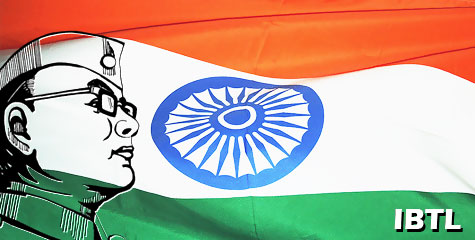Yes we ran away fm the hordes of Mujahideens sent to liberate Kashmir from the clutches of India into the arms of Pakist..

On return from England Subhas met Mahatma Gandhi. On his advice
he came into contact with Chitta Ranjan Das. Subhas became his
ardent disciple from 1921-25 and Bengal was his field of
activities. Subhas organised the congress party being attracted by
the Non-cooperation movement.
He also served as a Principal of National College established by
Deshbandhu Chitta Ranjan Das at Calcutta. Subhas though took active
in the Non-cooperation movement, was not satisfied with Gandhi's
ways and supproted Motilal and C.R. Das in organising the Swaraj
Party. As a result of his efforts Swaraj Party became very strong
and in the elelction of Calcutta cooperation the party got a
majority and subhas was appointed the chief executive officer of
the cooperation. Subhas edited "Forward", English daily and
stabilised the Swaraj Party.
The progressive activities of subhas and the Successful conduct of
boycott to Prince of Wales when he visited Calcutta, soon invited
the displeasure of the Government. He was deputed to Mandalay, but
his countrymen showed him their gratitude and elected him to Bengal
Legislative Council in his absence.
In the prison subhas was taken ill and had to be released because
the Government was afraid of consequences of his death in custody.
After regaining his health subhas again took active part in the
political life interest nation. Subhas Chandra Bose held mahatma in
high esteem but differed from him in many ideological and
strtaegical aspects. Subhas along with Jawaharlal Nehru represented
the left and progressive views inside congress. These two leaders
became the symbol of change in the congress.
In 1928 subhas attended the Calcutta session of Indian National
Congress. Subhas-Jawahar group first tested their strength that
they opposed the official resolution moved by Mahatma Gandhi and
secured 45% vote. In 1929 Jawaharlal became the President of Indian
National Congress with the support of Mahatma Gandhi.
However both Jawahar and Subash pushed through the Karachi
resolution of 1931, which besides endorsing the Gandhi-Irwin pact
included the principle of fundamental rights and national economic
programme. Economic plannings, land reforms, basic education, and
basic civil liberties were to be the frame work of future congress
programme.
The formation of congress socialist party in 1934 did not
attract subhas and Jawahar to its fold. They remained
within congress and successfully pushed through progressive views.
Subhas had a forced stay in Europe from 1933 to 1936. During his
stay in Europe he tried to educate the public opinion against
barbarism of British imperialism and enriched his knowledge about
west. For his radical views subhas suffered harrasment and frequent
arrests by the British government.
Even after his return from Europe in 1936 he was imprisoned under
Regulation III of 1818. But he was realesed in March 1937. Subhas's
pro-people, progressive and radical attitude, on the other hand,
made his popular inside and outside congress. Subhas represented
the young and extremist element in the congress and was elected its
president in 1938 and again in 1939.
The re election of subhas at the Tripura Session of congress was
against the expressed desire of Mahtma Gandhi. Gandhiji considered
Sitaramaya's defeat as his own defeat and the followers of Gandhiji
did not allow Subahs Chandra Bose to function effectively.
Subhas had wide difference with Mahatma over the issue of
India's stand on the world affairs, methods of freedom
stress on the view, not like by Gandhi, the Indian struggle for
independence should start at the sometime as the war broke out in
Europe.
Share Your View via Facebook
top trend
-

Tweets that tell the pain of Kashmiri Pandits : 19 Jan
-

Aryan Invasion Theory used for Divide and Convert : Exposed by fresh Genetic research
An inter-continental research in cellular molecular biology has debunked the Aryan invasion theory. This is a major setbac..
-

Delhi High Court to hear Swamy’s plea on EVMs before Assembly Elections
Delhi High Court has set January 10th as the date to decide on the issue of EVM’s use in comping Assembly elections...
-

Temples of Invisble gods
As you walk through the streets of Bali, an island in Indonesia, you cannot miss the temples in every street, in every hou..
-

Mahashivratri: The Spiritual science and the Divine Knowledge
Introduction : The festival of Mahashivaratri is celebrated on the 14th day of the dark fort..
what next
-
-
"Coal allocations since 1993 are arbitrary and illegal", Says Supreme Court
-
Palestine, 6 billion people and second hand opinions
-
Malegaon 2006 vs. Malegaon 2008 - Blast Politics
-
Who will investigate Chidambaram & Co for the Dabhol Loot?
-
Narendra Modi prepares to climb the ramparts of the Red Fort
-
The Great Jindal Swindle
-
AAP's insidious anti-Hindu agenda
-
Nagma - Sonia Gandhi's Star Soldier
-
Aam Aadmi Party : Anti-Modi stalking horse
-
What in God's name is Teesta Setalvad's agenda?
-
-
-
Time to rethink : Saffron surge and the secular debacle - Sri Sri Ravi Shankar
-
India's Wishlist for Prime Minister Narendra Modi
-
My first meeting with Narendra Modi - Sri Sri Ravi Shankar
-
Telangana - Divide and Rule?
-
Myths vs Facts about RSS
-
The Two States: Telangana and Seemandhra
-
Answering Media on Questions to Narendra Modi, but will they venture into responding these queries?
-
#AAPCon : Dilli ke log ban gaye Mamu
-
Secularism is just synonymous with Sanatan Dharm
-
Beware of the Hoax called Aam Aadmi Party
-











Comments (Leave a Reply)